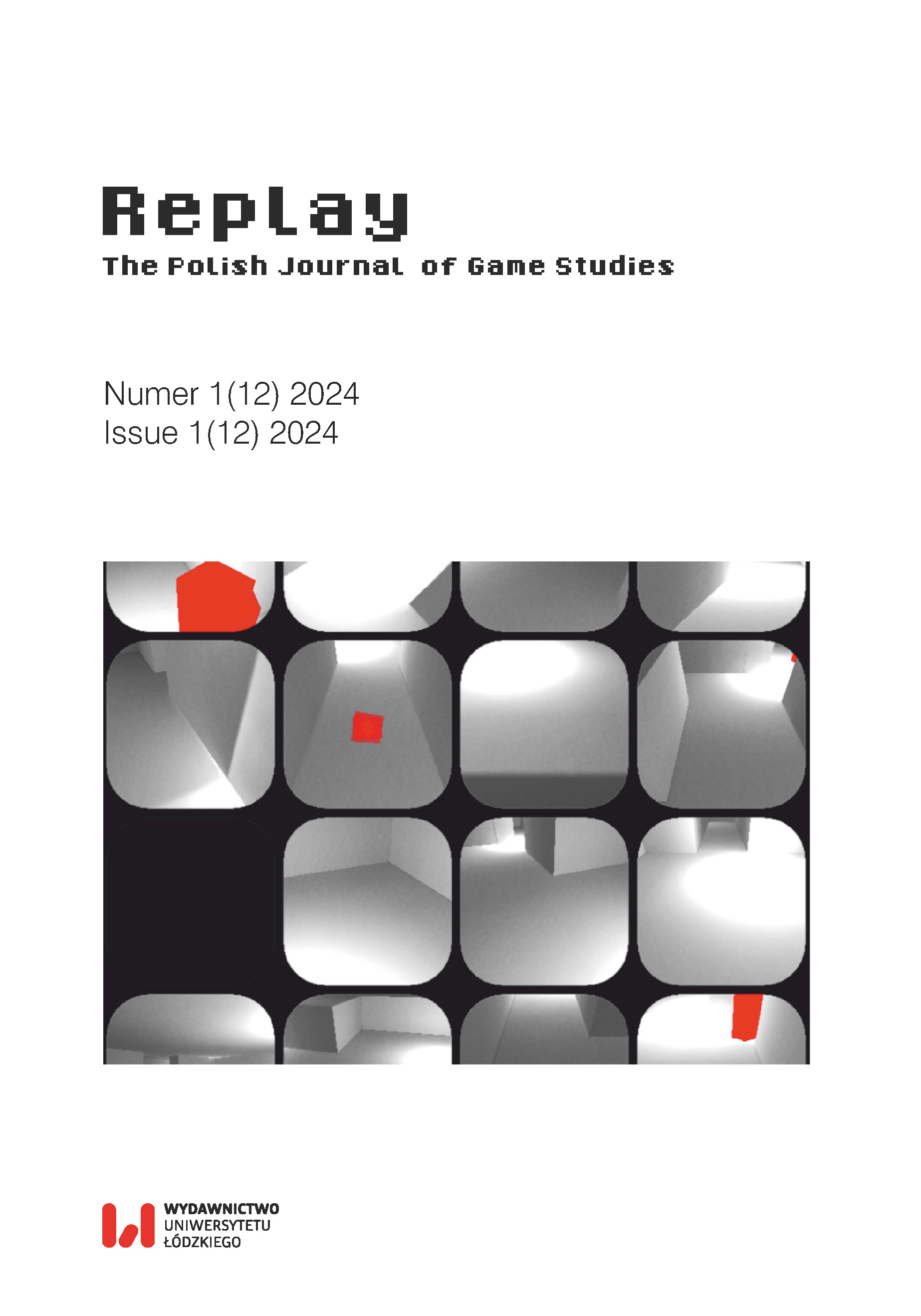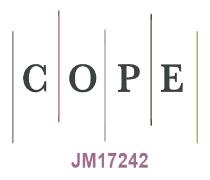Brewing Happiness Design Aspects of Coffee Representation in Cozy Games
DOI:
https://doi.org/10.18778/2391-8551.12.05Keywords:
cozy games, coffee, brewing, game design, game analysis, qualitative analysisAbstract
This paper examines the way coffee is represented and used in cozy games. As a genre, cozy games are defined by the concepts of safety, abundance, and softness, which together establish a sense of coziness. Coffee, commonly associated with casual and friendly social situations, has a potential to be a strong contributor to coziness within cozy games. To explore this, the authors identified 27 cozy games containing coffee-related elements, and then performed a qualitative analysis on their content. The analysis found it was comparatively rare for coffee themes to strongly impact the overall game experience; however, there was a significant tendency for coffee to amplify the game’s overall sense of coziness.
References
Bartle, R. (1996). Hearts, Clubs, Diamonds, Spades: Players Who Suit MUDs. Journal of MUD Research, 1(1), 19.
Google Scholar
Belman, J., & Flanagan, M. (2010). Designing Games to Foster Empathy. Cognitive Technology, 14(2), 5–15.
Google Scholar
Coffee. (n.d.). Stardew Valley Wiki. Online: https://stardewvalleywiki.com/Coffee (accessed on April 11, 2023).
Google Scholar
Czarniecka-Skubina, E., Pielak, M., Sałek, P., Korzeniowska-Ginter, R., & Owczarek, T. (2021). Consumer Choices and Habits Related to Coffee Consumption by Poles. International Journal of Environmental Research and Public Health, 18(8).
Google Scholar
DOI: https://doi.org/10.3390/ijerph18083948
Davidinc RPGs. (2023, February 6). Affogato Demo: Spotlight – A Cozy Coffee Shop RPG [Video]. YouTube. https://www.youtube.com/watch?v=dL2QUk_kGCg&ab_channel=Davidvinc
Google Scholar
Downs, I. (1986). The Last Mountain: A Life in Papua New Guinea. University of Queensland Press.
Google Scholar
Ensslin, A. (2011). Do Avatars Dream of Electric Steak? Videogames and the Gendered Semiotics of Food. Journal of Gaming & Virtual Worlds, 3(1), 37–50.
Google Scholar
DOI: https://doi.org/10.1386/jgvw.3.1.37_1
Fregulia, J.M. (2019). A Rich and Tantalizing Brew: A History of How Coffee Connected the World. The University of Arkansas Press.
Google Scholar
DOI: https://doi.org/10.1353/book63074
Garner, B. (2015). Interpersonal Coffee-Drinking Communication Rituals. International Journal of Marketing and Business Communication, 4(4).
Google Scholar
DOI: https://doi.org/10.21863/ijmbc/2015.4.4.019
Jenkins, H. (2006), Game Design as Narrative Architecture. In K. Salen & E. Zimmerman (Eds.), The Game Design Reader: A Rules of Play Anthology (pp. 670–690). The MIT Press.
Google Scholar
Kerr, G. (2021). A Short History of Coffee. Oldcastle Books.
Google Scholar
Knight, A. (2019). Reap What You Sow: The Seed and the Harvest of Wholesome Games. The Lifted Brow, 44, 5–8.
Google Scholar
Morris, J. (2019). Coffee: A Global History. Reaktion Books.
Google Scholar
Oniku, A., & Akintimehin, O. (2021). Coffee Culture: Will Nigerians Drink Coffee Like others? Journal of Humanities and Applied Social Sciences, 4(3), 236–250.
Google Scholar
DOI: https://doi.org/10.1108/JHASS-03-2021-0046
Özkök, G., & Erbay, M. (2022). Coffee as an International Beverage and its Influence on Cultural Communication. Socrates Journal of Interdisciplinary Social Studies, 15, 119–136.
Google Scholar
DOI: https://doi.org/10.51293/socrates.170
Pekoe Presskit (n.d.). Kitten Cup Studio. https://www.kittencupstudio.com/press-kit (accessed on August 28, 2024).
Google Scholar
Project Horseshoe (2017). Group Report: Coziness in Games: An Exploration of Safety, Softness and Satisfied Needs. Project Horseshoe. https://www.projecthorseshoe.com/reports/featured/Project_Horseshoe_2017_report_section_3.pdf (accessed on April 22, 2023).
Google Scholar
Ramanathan R., & Ali, N. (2021). Coffee Consumption and the Sustainability of the Coffee Industry in Malaysia. Trends in Undergraduate Research, 4(2).
Google Scholar
DOI: https://doi.org/10.33736/tur.3465.2021
Safitri D., & Nada, A. (2022). The Trend of Drinking Coffee Culture as Indonesian Culture. In Proceeding The 2nd ICHELSS (pp. 117–125).
Google Scholar
Salen, K., & Zimmerman, E. (2004), Rules of Play: Game Design Fundamentals. The MIT Press.
Google Scholar
Shaker Ardekani, R., & Rath, J. (2017). Coffee People in Tehran, Glasgow and Amsterdam. Journal of Consumer Culture, 20(1), 122–140.
Google Scholar
DOI: https://doi.org/10.1177/1469540517736557
Sullivan, A., Stanfill, M., & Salter, A. (2023). The Constraints of Cozy Games: Boyfriend Dungeon and Consent in Queer Play. In P. Lopes, F. Luz, A. Liapis, & H. Engström (Eds.), FDG’23: Proceedings of the 18th International Conference on the Foundations of Digital Games. Association for Computing Machinery.
Google Scholar
DOI: https://doi.org/10.1145/3582437.3582452
Topik, S. (2009). Coffee as a Social Drug. Cultural Critique, 71, 81–106.
Google Scholar
DOI: https://doi.org/10.1353/cul.0.0027
Turyasingura, J.B., & Agaba, M. (2022). Social-Cultural Factors and Coffee Consumption in Rukungiri District Uganda. Quest Journals: Journal of Research in Business and Management, 10(10), 207–215.
Google Scholar
Waern, A., & Back, J. (2015). Experimental Game Design. In P. Lankoski & S. Björk (Eds.), Game Research Methods: An Overview (pp. 341–353). ETC Press.
Google Scholar
Wang, S. (2022). The Differences and Integration between Tea Culture and Coffee Culture. Studies in Linguistics and Literature, 6(3), 22–28.
Google Scholar
DOI: https://doi.org/10.22158/sll.v6n3p22
Wäppling, A., Walchshofer, L., & Lewin, R. (2022). What Makes a Cozy Game? A Study of Three Games Considered Cozy [Bachelor’s thesis, Uppsala University]. M.A. thesis. Digitala Vetenskapliga Arkivet.
Google Scholar
Waszkiewicz, A. (2022). Delicious Pixels: Food in Videogames. De Gruyter Oldenbourg.
Google Scholar
DOI: https://doi.org/10.1515/9783110716603
Waszkiewicz A., & Bakun, M. (2020). Towards the Aethetics of Cozy Videogames. Journal of Gaming & Virtual Worlds, 12(3), 225–240.
Google Scholar
DOI: https://doi.org/10.1386/jgvw_00017_1
Werth, T. (2021, September 18). Why Are There So Many Coffee-based Videogames? QRUIS. https://qrius.com/why-are-there-so-many-coffee-based-video-games/ (accessed on August 26, 2024).
Google Scholar
Wiraseto, D. (2016). Coffee United: Brewing for Harmony. Ministry of Tourism, Republic of Indonesia.
Google Scholar
Access Games. (2010). Deadly Premonition. Access Games.
Google Scholar
Barone, E. (2016). Stardew Valley. Eric Barone a.k.a. ConcernedApe.
Google Scholar
CD Projekt. (2020). Cyberpunk 2077. CD Projekt.
Google Scholar
Chen, K. (2021). Necrobarista. Final Pour. Route 59.
Google Scholar
DomislavDev. (2021). Yerba Mate Tycoon. DomislavDev.
Google Scholar
Eguchi, K., Nogami, H., & Tezuka, T. (2002). Animal Crossing [GameCube]. Nintendo.
Google Scholar
Hunny Bunny Studio. 2022. Neko Maid. Hunny Bunny Studio.
Google Scholar
Kikai Digital. (2020). Caffeine: Victoria’s Legacy. Kikai Digital.
Google Scholar
Kishimoto, Y., Saiot, S., Kai, K., & Yamane, K. (1987). Double Dragon [Arcade]. Technos Japan.
Google Scholar
Melsoft Games. (2016). My Cafe – Recipes & Stories [iPhone/iPad/PC]. Melsoft Games.
Google Scholar
Nintendo. (2002). Animal Crossing. Nintendo.
Google Scholar
Nintendo. (2020). Animal Crossing: New Horizons [Switch]. Nintendo.
Google Scholar
Nishikawa, S. (2017). The Evil Within 2. Tango Gameworks.
Google Scholar
Nishiyama, T. & Miyamoto, S. (1984). Kung Fu Master [Arcade, NES]. Irem.
Google Scholar
Obishaku, Y., Yamana, M., & Tawada, T. (2020). Pokemon Cafe ReMix. Genius Sonority.
Google Scholar
P Studio. (2016). Persona 5. Atlus.
Google Scholar
Paradox Entertainment. (2003). Victoria: An Empire Under the Sun. Paradox Interactive.
Google Scholar
Pathea Games. (2018). My Time at Portia. Pathea Games.
Google Scholar
Peachy Keen Games. (2020). Calico. Peachy Keen Games.
Google Scholar
Rockstar Games. (2018). Red Dead Redemption 2. Rockstar Games.
Google Scholar
Rockstar North. (2004). Grand Theft Auto: San Andreas. Rockstar Games.
Google Scholar
Rockstar North. (2008). Grand Theft Auto IV. Rockstar Games.
Google Scholar
Thunder Lotus Games. (2020). Spiritfarer. Thunder Lotus Games.
Google Scholar
Toge Productions. (2020). Coffee Talk. Toge Productions.
Google Scholar
Toge Productions. (2023). Coffee Talk Episode 2: Hibiscus & Butterfly. Toge Productions.
Google Scholar
Vectorinox. (2018). Coffee Crawl. Vectorinox.
Google Scholar
Witch Beam. (2021). Unpacking. Witch Beam.
Google Scholar
Wright, W., Baity, S., Custer, J., Goss, M., Humble, R., Darga, M., London, Ch., Yang, M., Hunicke, R., Howe, H., Jalapayan, L., Holmberg-Weidler, E., Mazza, R., & Kalson, A. (2000). The Sims. Electronic Arts.
Google Scholar
Downloads
Published
How to Cite
Issue
Section
License

This work is licensed under a Creative Commons Attribution-NonCommercial-NoDerivatives 4.0 International License.










